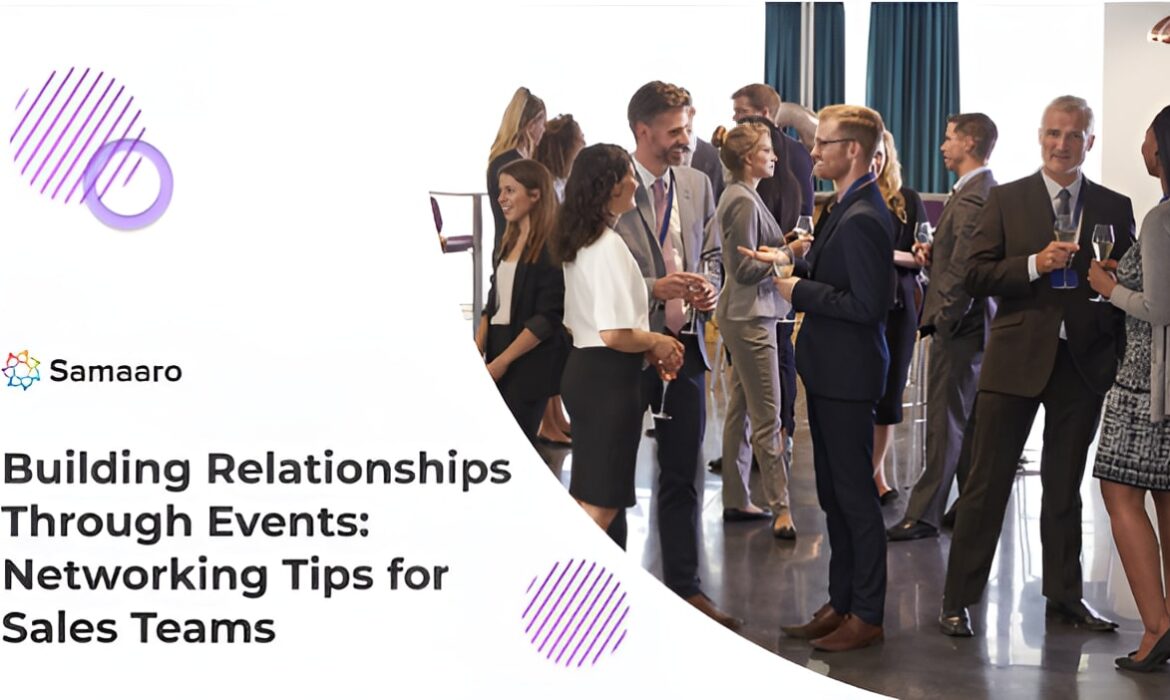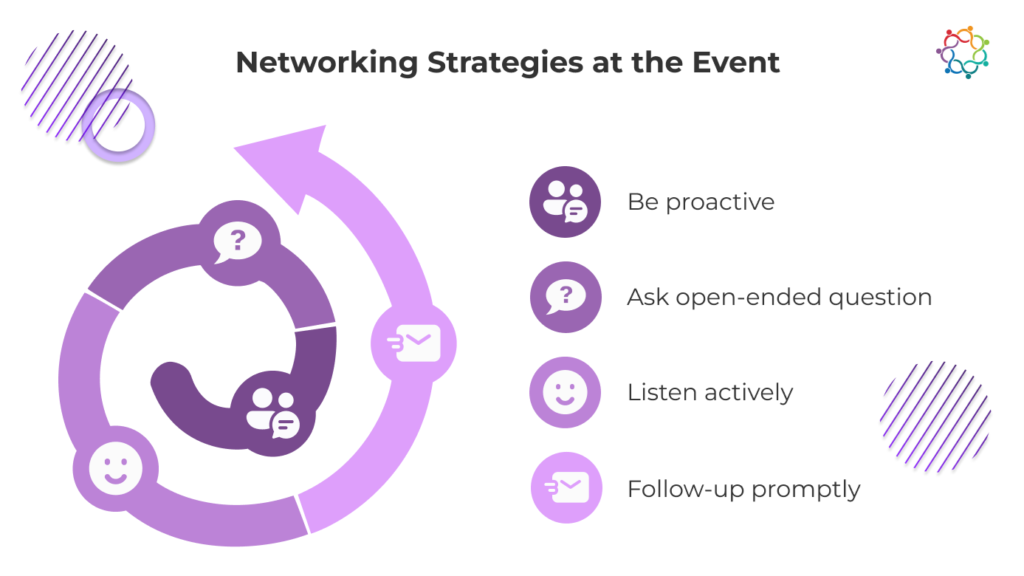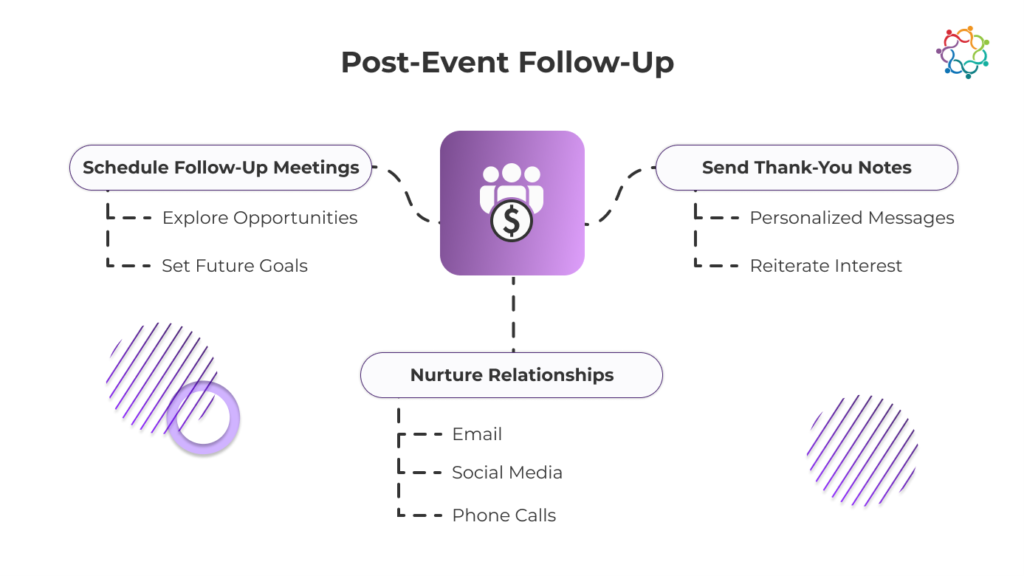Samaaro + Your CRM: Zero Integration Fee for Annual Sign-Ups Until 30 June, 2025
- 00Days
- 00Hrs
- 00Min

In the world of sales, relationship-building is essential, as strong connections often lead to greater business opportunities and long-term success. Networking provides sales teams with an invaluable platform to connect directly with prospects, understand their needs, and establish trust—all of which are crucial steps in the sales process. Events, whether they’re industry conferences, trade shows, or intimate gatherings, create a prime environment for meaningful networking by bringing like-minded professionals together in one place.
For sales teams, events are more than just meet-and-greet opportunities; they’re strategic touchpoints to build credibility, nurture leads, and cultivate partnerships that can yield high returns. By honing networking skills and employing effective strategies, sales professionals can turn event interactions into productive relationships, ultimately driving growth for their businesses. This guide highlights proven strategies and techniques for maximizing networking potential at events, from initial preparation to post-event follow-up, empowering sales teams to make the most of every interaction.
Pre-Event Preparation
Effective networking at events starts well before you arrive. A little pre-event preparation goes a long way in making meaningful connections.
Research Attendees
Understanding who will be attending the event can help you target potential prospects and approach them with relevant insights. Reviewing attendee lists, researching companies, and identifying decision-makers who align with your goals gives you a head start. By learning about attendees’ interests, challenges, and potential needs, you can tailor your approach and create more engaging conversations.
Set Networking Goals
Establishing clear goals gives direction to your networking efforts. Whether your objective is to connect with a certain number of prospects, introduce your brand to key players, or set follow-up meetings, defining your aims helps keep your interactions focused. When you know what you want to achieve, you can structure conversations to guide prospects toward those goals while ensuring a valuable experience for both parties.
Practice Your Elevator Pitch
Your elevator pitch is often your first impression, so it’s essential that it’s both clear and compelling. Practice introducing yourself and your company concisely, focusing on your unique selling points and the value you bring to clients. A well-crafted pitch can help you quickly capture attention and spark interest, setting the stage for a deeper conversation. Practicing beforehand allows you to deliver your pitch confidently and adapt it to each individual you meet.
With thorough pre-event preparation, you’ll feel more confident, stay focused, and maximize each interaction, making it easier to build meaningful connections right from the start.
Networking Strategies at the Event

Networking during an event requires a proactive approach and genuine interest in building connections. Here are some effective strategies to help you make the most of each interaction:
Be Proactive
Don’t wait for others to approach you—take the initiative to introduce yourself to new people. Approach attendees with confidence and start conversations by offering a warm greeting and introducing yourself. Making the first move shows confidence, helps break the ice, and positions you as approachable and engaged. Walking around the venue, joining group discussions, or even simply introducing yourself to someone standing alone can lead to valuable connections.
Ask Open-Ended Questions
To foster meaningful conversations, ask open-ended questions that encourage the other person to share more about themselves and their work. Instead of yes-or-no questions, ask about their challenges, current projects, or industry trends they’re interested in. This not only keeps the conversation flowing but also provides insights into their needs and goals, which can help you identify areas where you or your company can add value.
Listen Actively
Active listening is key to building rapport and showing genuine interest in others. Pay attention to what the other person is saying, nodding to acknowledge their points, and responding thoughtfully. By listening more than you speak, you demonstrate respect and interest in their perspective, which makes them feel valued. Remember, successful networking is not about pitching constantly; it’s about fostering genuine connections.
Follow Up Promptly
After an engaging conversation, plan to follow up with a personalized email within 24 hours. Reference specific points from your conversation to show you were paying attention and express your appreciation for their time. A prompt follow-up reinforces your interest in staying connected and can lead to follow-up meetings or future collaborations.
By actively engaging in these networking strategies, you’ll be able to build stronger connections, learn more about your prospects, and ultimately create a positive impact that lasts beyond the event itself.
Effective Networking Techniques
Using targeted techniques during an event can help you make the most of each interaction and leave a lasting impression. Here’s how you can elevate your networking skills:
Join Networking Groups or Activities
Take part in structured networking activities offered by the event, such as speed networking sessions, roundtable discussions, or industry meet-ups. These organized interactions provide a supportive environment to meet people, which can help ease networking anxiety. Being part of these activities often puts you in touch with individuals who share similar goals, making conversations feel more natural and focused.
Leverage Event Apps
Event apps are a powerful tool for connecting with other attendees, scheduling meetings, and sharing contact information. Many event apps, like Samaaro, allow you to view profiles of other attendees, see who’s attending specific sessions, and send direct messages. This way, you can pre-plan introductions and set up one-on-one meetings, helping you create a more purposeful event experience. Additionally, using an app can help you keep track of all your connections, making follow-up easier.
Attend Breakout Sessions and Workshops
Breakout sessions, panels, and workshops are excellent opportunities to engage with peers and industry experts on focused topics. During these sessions, actively participate by asking thoughtful questions and engaging in post-session discussions. This not only broadens your knowledge but also helps you connect with like-minded individuals who share a common interest, which can often lead to more meaningful relationships.
Offer Value
One of the best ways to build credibility and trust is to share valuable insights or expertise. Whether you’re discussing industry challenges, sharing tips, or offering solutions, providing value in your conversations can leave a positive, lasting impression. Look for ways to help others with insights or resources, as this selfless approach can make you memorable and respected. Remember, networking is about building relationships rather than just promoting yourself, and helping others builds goodwill that often comes back in unexpected ways.
By incorporating these techniques, you’ll not only expand your network but also deepen the quality of your professional relationships, creating lasting connections that benefit both your career and personal growth.
Post-Event Follow-Up

Following up after an event is a critical step to turn networking connections into lasting relationships. After returning from an event, make it a priority to reach out to the people you connected with while the conversations and impressions are still fresh. Here’s how to make your follow-up effective:
Send Personalized Thank-You Notes
Expressing gratitude is a great way to leave a positive, lasting impression. Send a brief thank-you note via email or LinkedIn to acknowledge the interaction and mention a specific detail from your conversation to show that you were genuinely engaged. Personal touches like this demonstrate professionalism and help reinforce the connection.
Schedule Follow-Up Meetings
If you identified specific opportunities or topics of mutual interest during the event, arrange a follow-up meeting to dive deeper. A quick coffee chat or virtual meeting can help solidify the relationship and explore how you might work together. Be clear about the purpose of the meeting, and suggest a few convenient times to make scheduling easier.
Nurture Relationships Over Time
Keeping a network strong requires more than just a one-time follow-up. Regular check-ins, sharing relevant articles, or sending congratulations on achievements help maintain connections in a meaningful way. Using LinkedIn, email, or even a CRM can help you track these touchpoints and keep up with your contacts’ updates and professional progress.
By following up effectively, you’re not only making yourself memorable but also building the foundation for a professional relationship that can lead to long-term opportunities.
Overcoming Networking Challenges
Networking can sometimes be daunting, particularly if you’re shy or new to an industry. Here are strategies to help overcome common networking challenges:
Overcoming Shyness
For introverts or anyone experiencing social anxiety, large networking events can feel overwhelming. Prepare in advance by practicing your elevator pitch and rehearsing a few key talking points. Start conversations with open-ended questions that get others talking about themselves, as this can relieve the pressure of carrying the conversation. Remember, small steps are valuable – even a few quality connections are worthwhile.
Dealing with Rejection
Not every conversation will lead to a strong connection, and sometimes you may encounter people who are disinterested or unavailable. Instead of taking it personally, view rejection as part of the networking process. Focus on those who are genuinely interested in connecting, and keep a positive attitude. Each experience offers a learning opportunity that builds resilience, which will help you confidently approach new connections in the future.
By addressing these challenges directly, you can become more comfortable in networking environments and build confidence, enabling you to make the most of each event and grow your network in a meaningful way.
Conclusion
Building relationships through events is essential for sales teams looking to expand their networks and create growth opportunities. By implementing these networking strategies—both during and after the event—sales professionals can build rapport, establish valuable connections, and ultimately enhance their sales outcomes.
Ready to see how Samaaro can support your networking goals? Book a demo and start your free trial.

Built for modern marketing teams, Samaaro’s AI-powered event-tech platform helps you run events more efficiently, reduce manual work, engage attendees, capture qualified leads and gain real-time visibility into your events’ performance.
Location


© 2026 — Samaaro. All Rights Reserved.